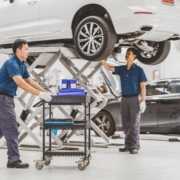Full Car Service Checklist (2025 Edition)
Regular car servicing is more than just an oil change; it’s about ensuring safety, optimising performance, extending longevity, and achieving cost savings. Whether you drive a compact sedan or a heavy-duty SUV, sticking to a proper maintenance routine can help avoid breakdowns, costly repairs, and even accidents.
This guide outlines everything you need to know about full car services, including what they encompass, when to schedule them, and how to maintain your vehicle at its optimal performance.
What Is a Full Car Service?
A full car service is a comprehensive inspection and tune-up of your vehicle. It usually includes around 50+ checks across your engine, braking system, tires, fluids, and electronics. While interim services focus on basic safety, a full service ensures your vehicle is fully roadworthy and performing efficiently.
Why Car Servicing Matters?
- Prevents breakdowns: Early detection of worn-out parts
- Increases resale value: Well-maintained cars fetch higher prices
- Improves fuel economy: Clean filters and tuned engines consume less fuel
- Boosts safety: Fully functional brakes, lights, and suspension reduce accident risk
Full Car Service vs. Interim vs. Major Service
| Type of Service | Frequency | What It Covers |
| Interim | Every 6 months or 6,000 miles | Basic checks (oil, brakes, lights) |
| Full | Annually, or 12,000 miles | Comprehensive 50+ point inspection |
| Major | Every 24 months or 24,000 miles | Includes replacement of key components |
Full Car Service Checklist
Here is a categorised breakdown of what you can expect during a full car service:
Engine & Fluids
- Oil and oil filter change
- Coolant level and condition check
- Brake fluid top-up
- Power steering fluid level check
- Transmission fluid inspection (if applicable)
Brakes & Tyres
- Brake pads and discs wear inspection
- Brake lines and hoses
- Tyre pressure adjustment
- Tread depth measurement
- Spare tyre check
Steering & Suspension
- Steering rack and joints check
- Shock absorbers and struts assessment
- Wheel alignment inspection
Electrical & Diagnostics
- Battery test and terminal cleaning
- Alternator output check
- Diagnostic scan for error codes
- Functionality check of all lights and indicators
Interior & Exterior
- Windscreen wiper condition
- Screen wash top-up
- Cabin air filter replacement
- Door locks and mirrors functionality
- Horn operation
Environmental Checks
- Emissions inspection
- Exhaust system leak check
When Should You Service Your Car?
Service Timeline:
| Interval | Key Tasks |
| Monthly | Check tyre pressure, oil, and washer fluid |
| Every 3,000 miles | Inspect belts, hoses, and coolant |
| Every 6,000 miles | Oil change, rotate tyres, battery check |
| Annually (12,000 miles) | Full service incl. filters, fluids, brakes |
| Every 24 months | Brake fluid replacement, aircon recharge, transmission fluid |
Benefits of Regular Car Servicing
- Peace of mind: Knowing your car is safe
- Legal compliance: Meets insurance and warranty requirements
- Lower costs: Avoids expensive emergency repairs
- Improved performance: Ensures smoother, more responsive driving
Frequently Asked Questions
What does a full car service cost?
Costs vary but typically range from $150 to $400, depending on your vehicle type and location.
How long does it take?
A full service usually takes between 2 to 4 hours.
Is a full service worth it?
Absolutely. The preventative maintenance included can save you thousands in future repairs and breakdowns.
Final Thoughts
Think of car servicing as a small investment that prevents large expenses. By following this checklist and booking services on time, you’ll ensure your vehicle remains safe, reliable, and efficient.
Need help? Book a full car service with us online in under 2 minutes.

